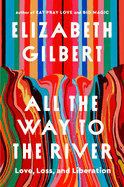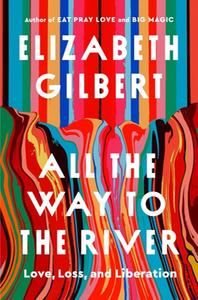
 Elizabeth Gilbert has been an iconic figure in the U.S. memoir space since her massive hit Eat Pray Love landed on bookshelves nearly 20 years ago. She scored another cultural bullseye with Big Magic in 2015. Both books explore self-discovery and creativity and celebrate the sometimes tangled way the self evolves. She's produced numerous works of fiction and journalism in the meantime.
Elizabeth Gilbert has been an iconic figure in the U.S. memoir space since her massive hit Eat Pray Love landed on bookshelves nearly 20 years ago. She scored another cultural bullseye with Big Magic in 2015. Both books explore self-discovery and creativity and celebrate the sometimes tangled way the self evolves. She's produced numerous works of fiction and journalism in the meantime.
Now, in her first memoir in a decade, All the Way to the River: Love, Loss, and Liberation, Gilbert takes readers to a darker, more complicated space than many of her earlier works. This is a harrowing, vital, and ultimately transcendent exploration of fierce love, codependency, and grief.
All the Way to the River is a love story, but not one drawn in soft-focus romantic tones. It's the story of Gilbert's profound and life-altering relationship with her one-time best friend and hair stylist, Rayya Elias, herself a charismatic, vehemently independent artist and musician. Their bond, forged over years of deep friendship, found new contours when Elias was diagnosed with terminal pancreatic and liver cancer. There, on the verge of permanent loss, they revealed to each other the depth and nature of their love.
But this joy was entwined with the fact that both women were addicts, albeit of different kinds. Elias had been in more or less successful recovery for a time, but as her pain increased and her time grew shorter, she relapsed in intense fashion, with Gilbert taking part and footing the bill. As Gilbert observes, "Love addiction, drug addiction, dependency, codependency--it's all the same thing: a disease so tireless and dirty and dignity-consuming that it will never rest until you're ruined."
Whereas Eat Pray Love is about finding oneself by traveling out into the world, All the Way to the River is about the perilous, interior journey of loving someone as they are leaving it. Gilbert confronts not only the anticipatory grief of losing the love of her life but also the chaotic, terrifying nature of their shared addictions. This unflinching examination of codependency, relapse, and the desperate, often messy, business of caregiving and boundary setting marks a stark departure from the aspirational tone of her previous work, grounding this memoir in a brutal reality. The beautiful narrative is complemented by Gilbert's poetry and sketches detailing the stages of her circumstances.
The lessons Gilbert derives from her devastating experience are hard-won and devoid of platitudes. The central liberation she references in the book's subtitle is not a sudden, sun-drenched epiphany, but a slow, painful untangling of self from another in order to love more fully and more honestly. --Elizabeth DeNoma, executive editor, DeNoma Literary Services, Seattle, Wash.
Shelf Talker: Gilbert's latest memoir is an in-depth honest and emotional reckoning with what it means to love and forgive oneself and other people.

